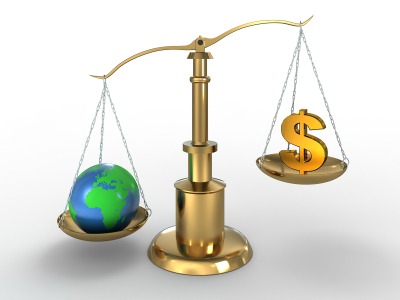Send your question to Umbra!
Q. Dear Umbra,
I own stock in Exxon Mobil. It was given to me by my grandparents when I was born (I’m now 46). I go back and forth between being appalled that I am making money off a company that I despise and thinking that at least by owning stock I can vote for some progressive changes (not that my vote ever seems to make a difference). Now I’m reading about 350.org asking universities to divest from their oil and gas portfolios, and wondering if I should do the same. My question is, if I sell my stock, won’t someone else just buy it who will be less inclined to vote for progressive change? I’ve thought about donating it to a nonprofit environmental group (Grist, perhaps) and letting them wrestle with this question. Umbra, what would you do in my situation?
Too Many Stock Options
Sagle, Idaho

A. Dear TMSO,
There’s a reason you’re going back and forth about this. It’s a tricky question. Your loving grandparents hardly knew the dilemma they were putting upon their precious little grandchild. Although they surely knew something: According to this handy index, the value of Exxon shares has risen from about $2 in 1970 to close to $90 today.
Actually, this story starts well before you were born. Travel with me for a moment to the 1930s, when a country still reeling from the Great Depression said, “Hey, you know what? If we put money into a company, we ought to be able to ask questions about how that company is run.” That’s why shareholders got the right [PDF] to add proposals to corporate ballots. In the early 1970s, prominent campaigns against Dow Chemical and General Motors paved the way for proposals that went beyond business and looked at corporate social responsibility, earning liberal bleeding hearts and others a seat at the table, too. Or at least a seat in the hallway leading to the boardroom.
Since then, shareholder activism has seen tangible results — here, for instance, is a list of recent environmental accomplishments spearheaded by the activist organization As You Sow. Increasingly, heavy hitters like state pension funds and colleges are pushing for progressive change from within. So in theory, you could hang on and fight the good fight. But should you?
I put your dilemma to Jack Robinson, a green-investment pioneer now allied with Brown Advisory, who says there’s no easy answer: “You could argue either side, and be right. There’s something to be said for holding on to stock if you intend to be an activist, and if you have enough of a position to have an impact.” But having “enough of a position” means owning a lot of shares, or having allies with enough shares to get the corporation’s attention. And even then there’s no guarantee.
Exxon, for example, appears to fight tooth and nail against most shareholder actions, whether the issue at hand is climate change or gay rights. And even if all those resolutions passed, Exxon would still be in the business of wrecking the planet. Which is exactly why 350.org is urging major institutions to divest.
Here’s how 350.org founder Bill McKibben explained it to me: “If Apple is using cheap labor to make iPhones, the problem is not the iPhone, and the solution is to pressure them to raise wages. But the fossil fuel business plan is to find ever more coal, gas, and oil, and burn it. There’s not a flaw in their business plan that can be fixed — the flaw is their business plan.”
So, TMSO, here’s my take on your options:
- Stay put. In this scenario you will diligently cast votes for progressive policies the company is unlikely to adopt, and your money will support the fossil fuel industry every day. This seems un-ideal, given your unease.
- Sell. You could, as Robinson points out, “reinvest in a company that’s part of the solution as opposed to being part of the problem.” Or you could treat yourself to a solar-paneled suit. Whatever you do, you can’t worry about who will buy your stock. The larger point is that you would be part of a growing movement of people and institutions divesting from fossil fuels — a movement that, says Robinson, has enough legs to make it reminiscent of the divestiture effort of the 1980s that helped end apartheid. (See what Grist’s Susie Cagle has to say on why that frequently drawn comparison isn’t quite apt.)
- Donate. You won’t get the proceeds, but you will get a tax benefit, plus the joy of supporting an organization that means something to you. McKibben says “lots of folks have taken to donating their fossil fuel stock” to 350.org. Grist will gladly accept stocks too, as will many other organizations. Rather than wrestle with the moral implications, most groups sell the stock immediately and, as Bill puts it, “put the money to work fighting for a different world.”
If I know you, TMSO (full disclosure: I don’t), you’re going to keep thinking about this — and that’s OK. “You’re not alone in your predicament, whether you own one share or 1 million shares,” says Robinson.
But if you do own 1 million shares, I’m free for coffee after 2 p.m. on Tuesday.
Bullishly,
Umbra



